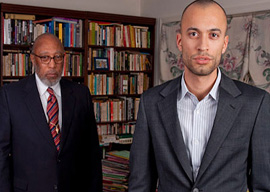
April 04, 2012

Clarence Leon Williams and Thomas Chatterton Williams

All else being equal, does naming your child after an English poet give him a better chance in life than making up some Ghetto Fabulous name to advertise your commitment to keeping it real?
That seemed to be the opinion of Williams’s father:
“Thomas Chatterton,” he”d say, addressing me by my middle name … “Do you know you wear the name of a brilliant poet, son?”
(The poet Thomas Chatterton, 1752-1770, was the original wild child. He died at 17 like Trayvon.)
The most comprehensive analysis of “The Causes and Consequences of Distinctively Black Names“ was conducted by Steven D. Levitt of Freakonomics fame and the black Harvard economist Roland G. Fryer, Jr. (Charlemagne’s boon companion was named Roland and became a central figure in medieval poetry.)
Levitt and Fryer tabulated every new birth certificate in California from 1961-2000. Beginning in the black-power era of the late 1960s, black parents began bestowing an ever-increasing proportion of oppositional first names on their babies, especially girls. Unsurprisingly, these names tend to be the choices of mothers who are bad decision-makers themselves. Levitt and Fryer write:
…a woman with a [Black Name Index] equal to 100 (implying a name that no Whites have) is…31.3 percentage points more likely to have been born out-of-wedlock than a Black woman living in the same zip code with the same age and education, but carrying a name that is equally common among Whites and Blacks.
Yet Fryer and Levitt can”t find much evidence on an individual level that naming your child D”Qisykha will make her worse off than all the other problems she will inherit merely from being the daughter of somebody who might name her daughter D”Qisykha.
Still, I suspect that their analysis misses the point that culture works not only at the personal level. It’s a little like the impact of gun ownership, which is hard to track among individuals. Because of gun control, Brits get burglarized more and get in more stupid brawls, while Americans are more likely to wind up dead after a stupid brawl.
Higher-class blacks tend to give their children less self-defeating names. “Danielle” is a clever compromise that shows up three times out of the 142 names of Florida’s black 2012 National Achievement Scholars. The “D” sound is Afro-loyal, but white employers won”t automatically perceive a Danielle’s job application as a discrimination lawsuit waiting to happen.
This is an era almost without a generation gap, so it particularly matters what legacy parents bestow on their children. African-Americans grow up in a popular culture that constantly validates their worst instincts. Just as Charles Murray complains about upper-class whites, better-off blacks seldom give underclass blacks guidance anymore. As Thomas Chatterton Williams suggests, it’s time for some adult supervision.

(Images by Sean Tejaratchi)